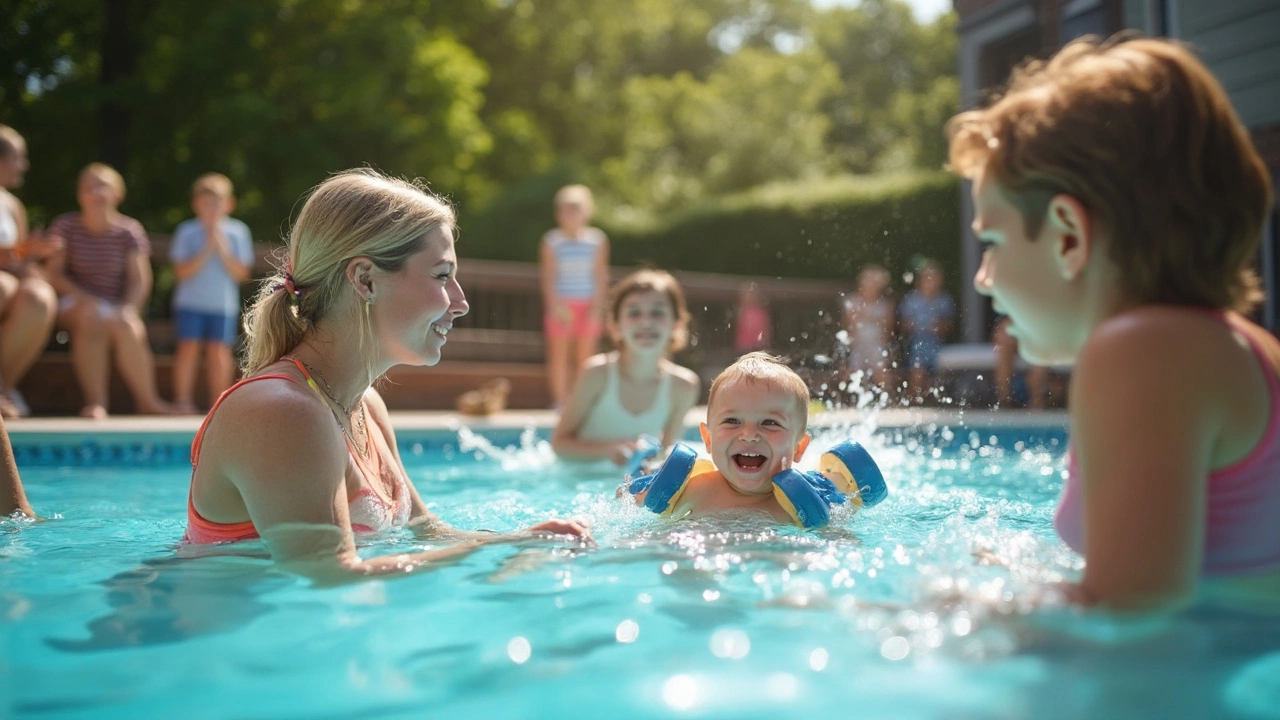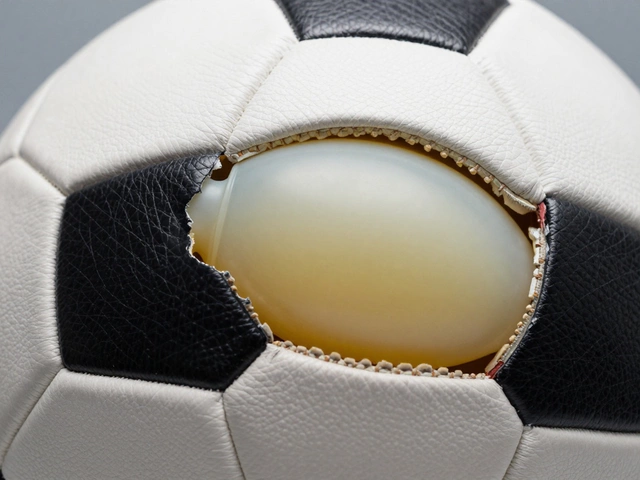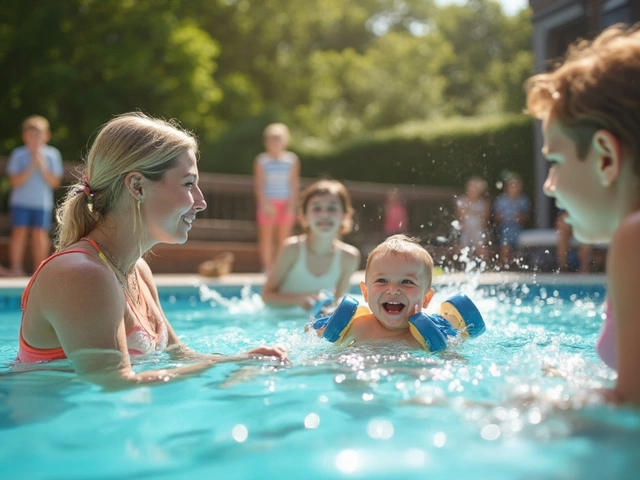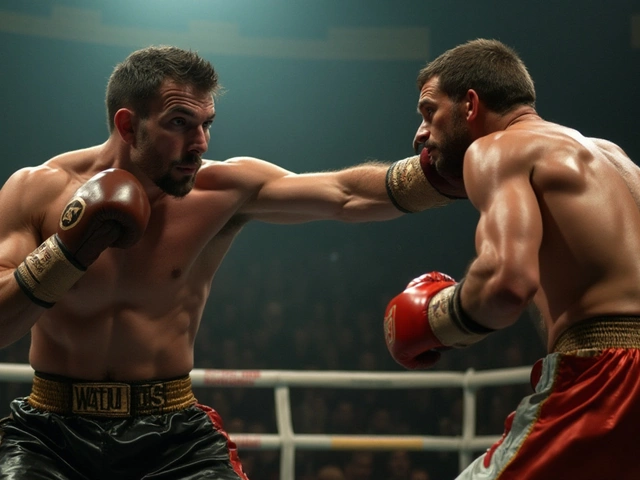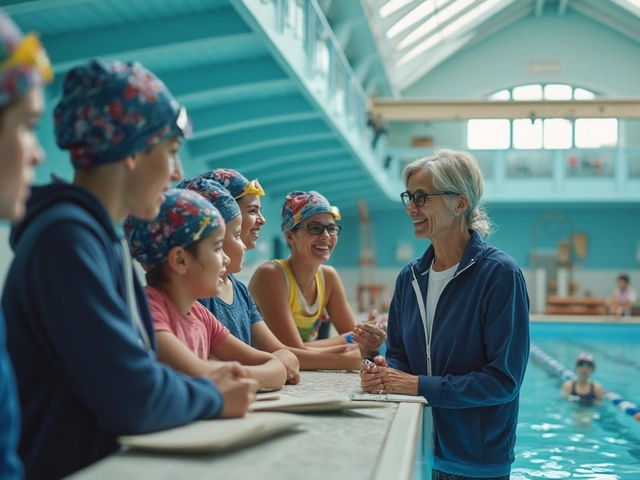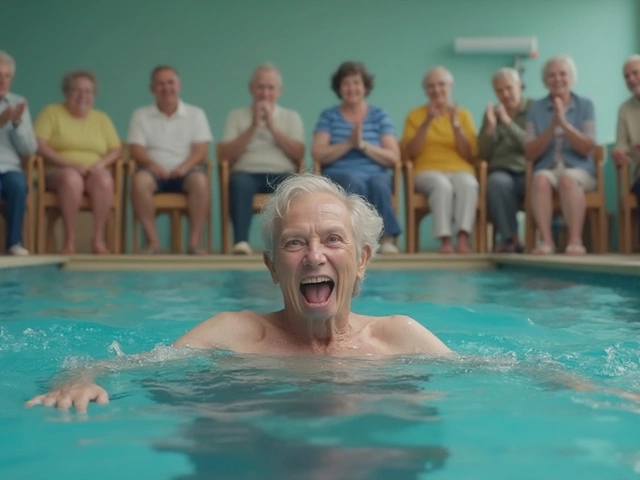So, you're thinking about when to enroll your little one in swimming lessons, right? It's a question that many parents grapple with. Let's face it, swimming is more than just a fun summer activity; it's a skill that could one day save a life. But when is the right time to start?
Interestingly, some experts suggest that the right time might be sooner than you'd think. Babies as young as six months can start water adjustment classes, but structured lessons typically begin around age four. Why? Because that's when kids usually have the physical and cognitive skills to learn basic strokes and follow instructions.
But hey, don't panic if your child hasn't started by then. Every kid progresses at their own pace, and it's never too late to learn. In fact, older kids might even pick it up faster due to better concentration and coordination. So, whether you're dealing with a toddler or a tween, there are benefits to starting swimming lessons tailored to their age.
- Why Age Matters
- Benefits of Starting Young
- Ideal Age Range for Lessons
- Tailoring Lessons to Age
- Parental Involvement
- Common Myths and Questions
Why Age Matters
Choosing the right age for swimming lessons isn't just about following a trend. There's real science and practicality behind it. Let's dive into the reasons why age can make a big difference when learning to swim.
The Developmental Angle
Physical and cognitive skills develop as your kid grows. For most children, ages 4 to 6 signals the sweet spot where they can understand instructions and coordinate their bodies effectively in the water. This doesn't mean younger kids can't enjoy the water. It simply means that their ability to learn structured skills like the front crawl or backstroke improves as they hit this age range.
Confidence is Key
Starting at the right age nurtures confidence. Imagine trying to learn something way before you're ready—frustrating, right? The same goes for swimming. Kids around age four usually have the emotional resilience to stick with lessons without frequent meltdowns.
Long-Term Habit Formation
You'll often hear that skills learned at a young age stick better. Water safety becomes second nature if you start young, which means fewer hesitations or fears later on. That's why experts recommend parents think about swimming lessons not just as an option but as a priority for their kids around this age.
| Age | Development Qualities |
|---|---|
| Under 3 | Water adjustment classes for comfort |
| 4-6 | Basic strokes and safety skills |
| 7-12 | Improved coordination and endurance |
Overall, the 'best age' isn't set in stone. Each child is different, but sticking to these general guidelines helps ensure your kiddo gets the most out of their learn to swim experience, without overwhelming them or letting crucial years slip by.
Benefits of Starting Young
Ever watched how quickly young kids pick up new skills? That's probably one of the biggest perks of enrolling them in swimming lessons early on. Their brains are like sponges, and they thrive in environments that encourage physical learning and exploration. Let's dive into a few solid reasons to start young.
Building Confidence and Coordination
When kids start swimming early, they not only learn to navigate through water but also develop confidence. This newfound assurance often carries over into other areas of life. Plus, swimming enhances coordination. Imagine all those little muscles working together simultaneously—that's a motor skills goldmine.
Water Safety Skills
If there's one thing you want to impart to your child, it's the ability to be safe in and around water. Kids who learn to swim at a younger age tend to develop a respectful but not fearful relationship with water. This could make all the difference in a potentially hazardous situation.
Social Interaction and Fun
Swimming lessons offer a fantastic way for children to meet peers, especially if classes are small. Sharing giggles in the pool can build friendships that last beyond the water. It's learning disguised as playtime, and who doesn't love that?
Adaptable Learning Pace
With a structured, age-appropriate program, children swimming lessons can evolve with your child’s abilities. Instructors modify their teaching techniques based on each child's development stage, ensuring that children aren't pushed too hard but continue to be challenged.
The earlier your child learns to swim, the earlier they not only become safer but also get to enjoy swimming as a fun, lifelong activity. If you plan to take the plunge, starting young might just offer the most splash for your effort.
Ideal Age Range for Lessons
You're eager to get your child into the water, but when is the right time? The best age for swimming lessons often ranges from 1 to 4 years. This period is perfect for introducing kids to water in a fun and non-intimidating way.
By the time they're four, most kids are ready for more structured lessons. Why? Around this age, children usually develop better motor skills and can follow simple instructions, paving the way for basic swimming techniques. They start learning primary skills like floating, kicking, and proper breathing, which are the foundation of swimming.
Benefits of Starting Early
Getting started between 1 and 4 not only acclimates your child to the water but can also enhance their confidence. Kids often learn faster when they're young because they have fewer inhibitions. Plus, early exposure can reduce fear and anxiety around water later on.
According to the Australian Swimming Coaches and Teachers Association, kids who begin lessons at a younger age are less likely to develop a fear of water as they grow older.
| Age Range | Recommended Focus |
|---|---|
| 1 - 2 Years | Water acclimation, safety skills |
| 3 - 4 Years | Basic techniques, water safety |
| 4+ Years | Structured lessons, skill improvement |
But remember, there's no strict timeline. Some kids are ready sooner, while others might need a bit more time. Observe your child, consider their comfort and ability, and talk to instructors if you're not sure.
Older Starters
If your child is starting lessons later, don't worry! Kids older than four may adapt quickly due to their improved mental and physical coordination. They can often progress through skills at a rapid pace, so it's never too late to dive in!
Ultimately, the right age can depend on the child's readiness, comfort in water, and eagerness to learn. The key is to ensure they feel safe and excited about learning.
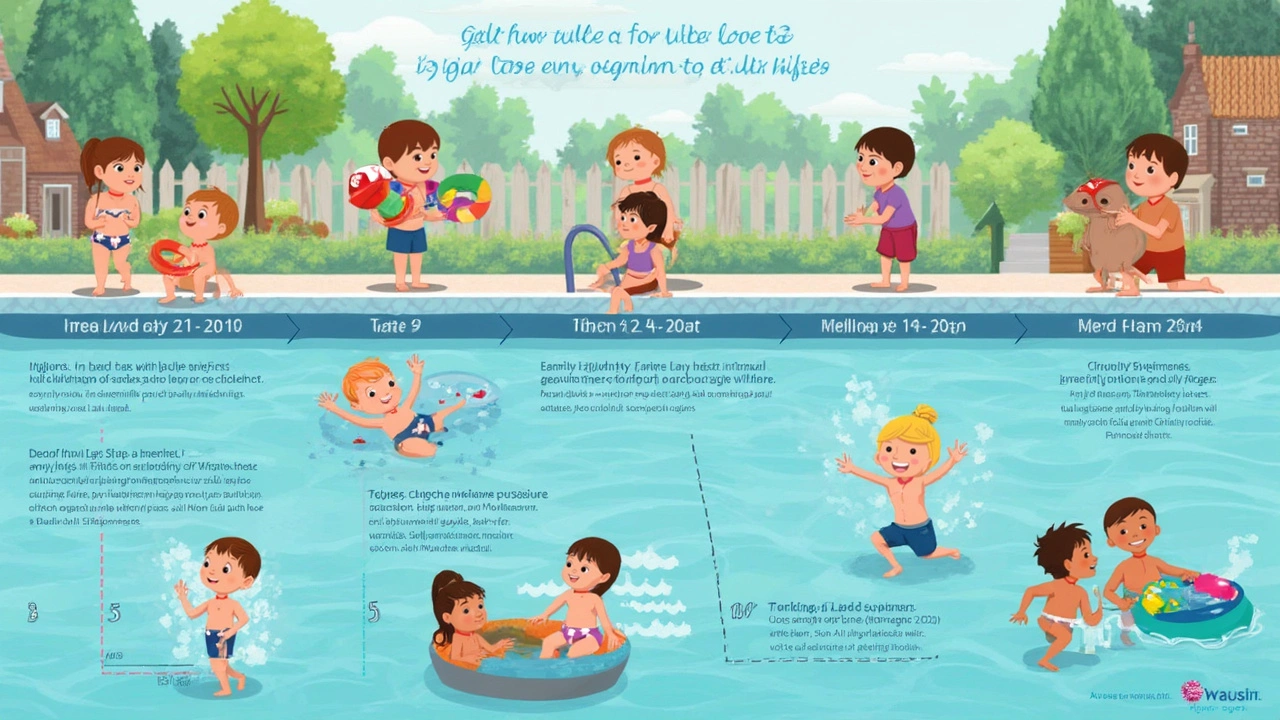
Tailoring Lessons to Age
Choosing the right kind of swimming lessons for your child's age isn't just about water play—it's about ensuring they learn safely and confidently. Each age group has its own needs and capabilities, so let's dive into how you can match lessons to your child's age.
For Toddlers (Ages 1-3)
At this tender age, it's all about getting them comfortable in the water. Lessons focus on water adjustment and safety basics. Splashing around while you hold them, blowing bubbles, and learning to float are typical activities. Remember, it’s more about water fun than technique, but safety around water is key.
Preschoolers (Ages 4-5)
This is often when kids first attend structured swimming lessons. They'll start learning basic strokes like the front crawl and back float. They'll also start understanding water safety more, which is crucial. It's also a great age for building confidence as they'll start to swim short distances without help.
School Age Kids (Ages 6-12)
Here, it gets a bit more serious in terms of technique. Kids build endurance, refine their strokes, and learn new ones like the breaststroke. By this age, kids aren't just learning to swim—they're starting to swim laps and might even join a swim team. Remember, these lessons can now focus on fun competitions and water games to keep them engaged.
Teens and Beyond
For teens, the focus shifts to advanced techniques, swim conditioning, and even lifesaving skills. It's a perfect age for those interested in high-level competitions or lifeguard training. Teens who start late might progress quickly thanks to better coordination and motivation.
To sum it up, whatever your child's age, tailor the lessons not just for skill but for enjoyment too. After all, the best way to instill a love for swimming is to make it fun and rewarding!
Parental Involvement
Diving into the world of swimming lessons isn't just about dropping the kiddos at the pool and calling it a day. Your role as a parent can greatly impact how effective and enjoyable their swimming journey becomes. So what should you do?
Be Their Cheerleader
Your encouragement matters more than you think. Celebrating even the tiniest of their achievements can boost their confidence. Imagine the joy on your child's face when they realize you've been right there cheering them on!
"Parents play a crucial role by offering emotional support and helping children overcome fear and anxiety in the water." – National Drowning Prevention Alliance (NDPA)
Stay Informed and Involved
While it's great that professionals handle the technical stuff, understanding what your child is learning and practicing alongside them can be beneficial. Consider attending some lessons, if possible, and ask the instructor how you can support your child’s progress at home.
Create a Fun Environment
Swimming should be fun, not a chore. Turn practice times into bonding opportunities. How about a family swim day? A little splash competition never hurt anyone!
Safety First
- Always supervise your child around water.
- Learn CPR and basic rescue techniques.
- Ensure your child takes breaks and stays hydrated, especially during long swim sessions.
Feeling a bit more involved in their swimming lessons journey can unlock a lot of potential for growth, not to mention create some lasting memories. Remember, it’s as much about learning a life skill as it is about enjoying time together.
Common Myths and Questions
Let's tackle some of those pesky myths that hover around like water bugs at a pool party. First up on our swim myth-busting tour is the idea that you have to start swimming lessons super early, or else, your kiddo is doomed to fail. Good news: that's not true. While diving into swimming lessons early can be awesome for building confidence, kids can successfully learn to swim at any age.
Myth #1: Swimming Lessons Are Only for Kids
Oh boy, this one couldn't be more off-base. Swimming is a life skill that everyone can benefit from, no matter what age. Adults can take swimming lessons too, and many do! It’s never too late to improve safety around water while getting in a refreshing workout.
Myth #2: Floaties Make Kids Safe Swimmers
Here’s the scoop: while floaties might give a false sense of security, they don’t exactly teach swimming skills. In fact, they might encourage bad habits like incorrect body positioning. Proper instruction should focus on learning to swim without relying on flotation devices.
Question: What's the Best Age for Swimming Lessons?
The million-dollar question! Many swimming instructors suggest starting formal lessons at age four when kids are more apt to learn structured techniques. However, introducing them to water fun and safety concepts much earlier can never hurt.
| Age | Possible Skills & Activities |
|---|---|
| 6 months | Water orientation, bonding between parent and child |
| 1-2 years | Basic water familiarization, floating with assistance |
| 3-4 years | Independent water entry and exit, basic kicks and glides |
| 5+ years | Structured lessons, learning strokes, building confidence |
Question: Are Private Lessons Better Than Group Classes?
This ultimately depends on the child. Private lessons offer one-on-one attention, which is great for customized learning. On the other hand, group classes can encourage social interaction and can help some kids learn by seeing peers in action.
If you're hanging on the fence about swimming lessons, remember, there's no wrong time to start. The key is finding the right environment where your child feels safe, happy, and excited to learn. Got other questions? Dive right in and find the resources or instructors that suit your family's needs!
